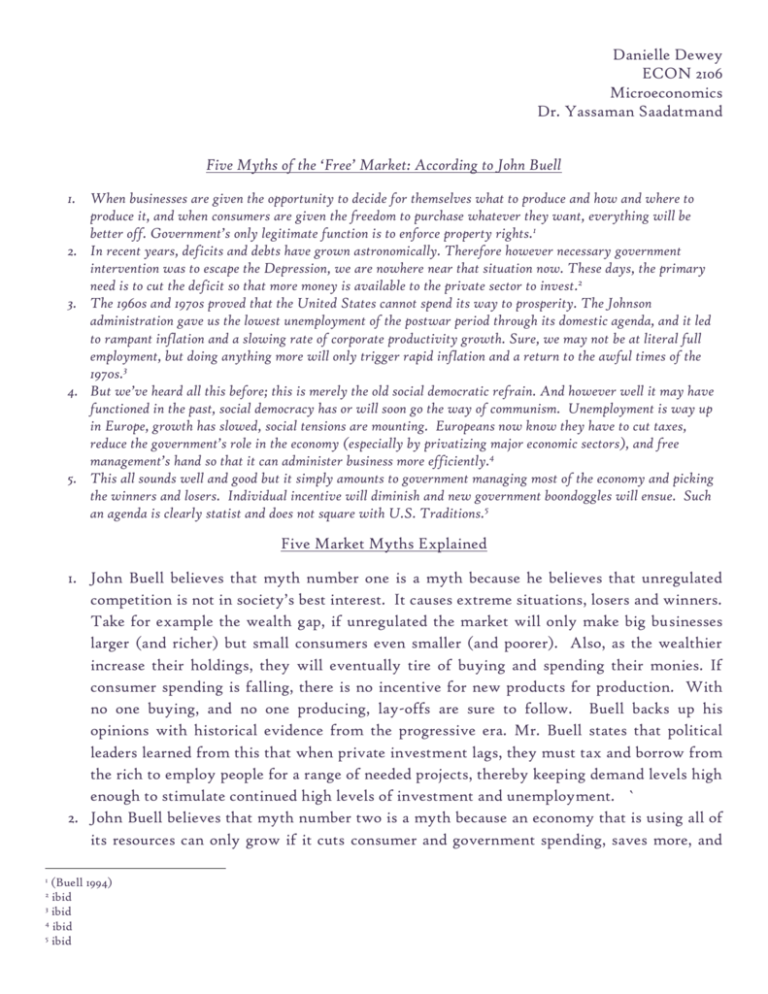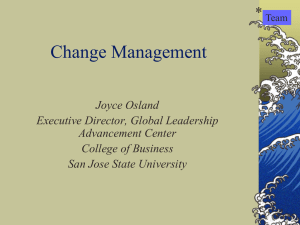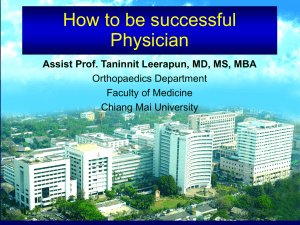File
advertisement

Danielle Dewey ECON 2106 Microeconomics Dr. Yassaman Saadatmand Five Myths of the ‘Free’ Market: According to John Buell 1. When businesses are given the opportunity to decide for themselves what to produce and how and where to produce it, and when consumers are given the freedom to purchase whatever they want, everything will be better off. Government’s only legitimate function is to enforce property rights.1 2. In recent years, deficits and debts have grown astronomically. Therefore however necessary government intervention was to escape the Depression, we are nowhere near that situation now. These days, the primary need is to cut the deficit so that more money is available to the private sector to invest.2 3. The 1960s and 1970s proved that the United States cannot spend its way to prosperity. The Johnson administration gave us the lowest unemployment of the postwar period through its domestic agenda, and it led to rampant inflation and a slowing rate of corporate productivity growth. Sure, we may not be at literal full employment, but doing anything more will only trigger rapid inflation and a return to the awful times of the 1970s.3 4. But we’ve heard all this before; this is merely the old social democratic refrain. And however well it may have functioned in the past, social democracy has or will soon go the way of communism. Unemployment is way up in Europe, growth has slowed, social tensions are mounting. Europeans now know they have to cut taxes, reduce the government’s role in the economy (especially by privatizing major economic sectors), and free management’s hand so that it can administer business more efficiently.4 5. This all sounds well and good but it simply amounts to government managing most of the economy and picking the winners and losers. Individual incentive will diminish and new government boondoggles will ensue. Such an agenda is clearly statist and does not square with U.S. Traditions.5 Five Market Myths Explained 1. John Buell believes that myth number one is a myth because he believes that unregulated competition is not in society’s best interest. It causes extreme situations, losers and winners. Take for example the wealth gap, if unregulated the market will only make big businesses larger (and richer) but small consumers even smaller (and poorer). Also, as the wealthier increase their holdings, they will eventually tire of buying and spending their monies. If consumer spending is falling, there is no incentive for new products for production. With no one buying, and no one producing, lay-offs are sure to follow. Buell backs up his opinions with historical evidence from the progressive era. Mr. Buell states that political leaders learned from this that when private investment lags, they must tax and borrow from the rich to employ people for a range of needed projects, thereby keeping demand levels high enough to stimulate continued high levels of investment and unemployment. ` 2. John Buell believes that myth number two is a myth because an economy that is using all of its resources can only grow if it cuts consumer and government spending, saves more, and 1 (Buell 1994) ibid 3 ibid 4 ibid 5 ibid 2 invests more of that savings in the development of new plants and equipment. The problem for myth number two believers, in the author’s opinion, is that the US economy in 1994 (when this article was penned) is nowhere near full employment of any of its resources, neither human nor capital. Buell also counts the true unemployment against the myth, stating that what is measured, while already low for postwar standards, is grossly inaccurate in its measurement methods. The debt in 1994 is a much lower percentage of GNP than it was following WWII. More important than the amount of debt, is the question of what the government spends its money on and the policies which accompany those expenditures. The author states these facts will become more evident as the remaining three myths are explored. 3. John Buell believes that myth number three is a myth because the Johnson administration ended up spending a lot, to use one of our classes first analogies, tried to give us both guns and butter. According to the author, military spending does not modernize an economy. And that compared to our foreign competitors we were falling behind spending too many resources on the military and not public works. Also while the Johnson administration cared about young school age citizens, it neglected the needs of thos in the workplace. This widened the income gap further. The experience of most Europeans contradicts the commonly thought and taught notion that an official unemployment rate below 6% would lead to inflation. Europeans themselves prove this myth wrong. 4. John Buell believes that myth number four is a myth because the problems faced by Europe in the 1990s isn’t from excess social democracy but from experimentation with so called conservative economics. Europe’s true problems are twofold: how to extend social democracy internationally and economically, and how to deepen the voice of workers in the corporate and political arenas. Buell feels the answer is to require expanded trade to be accompanied by effective labor guarantees, minimum wage standards pegged to the productivity of each nation, and an international capital fund which will invest in employment and infrastructure in regions of high unemployment throughout the trading bloc. Mr. Buell further states that the great tragedy of our current era may be that the conservative myopia about debt and free markets will allow worldwide unemployment to go very high before domestic and international intervention is undertaken. Democracy itself could increasingly become a casualty in such a scenario. 5. John Buell believes that myth number five is a myth because on the contrary, governments have always provided the basic conditions for economic growth. Public works would be underprovided because they benefit too many parties that cannot be charged for consumption/use (free-riders). Because development is a process driven by public initiative rather than by automatic market forces, there will always be hard choices; However, denying the need or desirability of some form of public intervention paradoxically discourages the broad public discussion that is needed. Bibliography Buell, John. "Market Myths." The Humanist, July/August 1994: 39-42.











